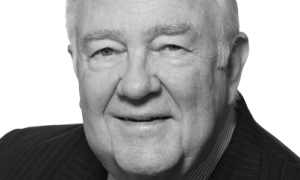DANA BASH: Now let's hear from a Reagan White House insider who knows a thing about the process. I spoke a short while ago to Ed Meese. I began by asking him if he knows who the President has chosen.
ED MEESE: And only the President knows and maybe one or two others in the White House. I don't think any of the rest of us do.
BASH: You though have been one of a handful of people who have been meeting regularly with White House officials to talk about the strategy, to talk about the process, to talk about this moment and how to move forward. Discuss some of that, what the plans are in place for nominating and then starting to tomorrow to sell the nominee.
MEESE: Well, the President has committed himself to nominating someone in the mold of Scalia and Thomas. And obviously, it's possible that left wing elements, special interest groups will try to motivate some to oppose these nominees.
Our purpose has been to assist in developing a strategy to work with members of the members of the Senate, Senate leadership as well as outside groups to provide support for the President's nominee once that's made.
BASH: And describe support. What exactly with the plans in place.
MEESE: Unfortunately, since judge Bork's nomination, left wing special interest groups have mounted essentially a political campaign against nominees. And our job is to find a coalition of people who will be supportive of a constitutional oriented candidate for the Supreme Court to be nominated by the President.
BASH: Now, you were part of the White House team for a lot of nominations for Justice O’Connor for Rehnquist, Skalyia, and of course, for Judge Bork. What exactly do you think the White House has learned from all of those nomination processes, especially judge Bork?
MEESE: Well, in the first nominations, they were hard fought in some ways, less so with Justice O’Connor because the Republicans had the leadership in the Senate at that time. More so or less -- there was a considerable controversy to some extent raised by some with Chief Justice Rehnquist, very little with Scalia who was nominated at the same time. but when Judge Bork was nominated, there was a whole sea change in the way in which opposition members, in this case the Democrats who both head the leadership in the Senate and also unfortunately, I think, carried the water for the left wing special interest groups made a political contest out of it, even with advertising, television ads, those kinds of things.
BASH: One thing that we’re understanding is that everybody sort of learned from Bork is perhaps it's not the greatest thing to have a long paper trail of opinions of writings because they can be used potentially against the nominee. There is one candidate who has been out there and it's -- we certainly have to be careful but a lot of buzz about Edith Clement. She is somebody who does not have a long paper trail and there are some conservatives who are actually worried about that. On the one hand, it means she can't get attacked but on the other hand, it may make it unclear how conservative she will be on the court.
MEESE: Well, I think that the President and the White House and the Justice Department have really gone noon some detail for whoever is the candidate. And sometimes a lack of a paper trail, as you put it, can mean there's not that much known about them, but I think that's understood by the White House and that's why I’m sure they've gone to a great extent to understand what the judicial philosophy is of whoever's going to be the nominee, whether they have a long paper trail or not. One thing you do know is even sometimes candidates with a long paper trail who seem to be absolutely perfect based on everything they've ever written or everything they've ever said, and yet, they turn out to be disappointments. You can't tell for sure.
BASH: One final question since we don't know who the nominee is. Define the moment in terms of what this nomination will mean for the court in terms of the cases they will see, abortion and other sort of hot button issues.
MEESE: Well, again, if the nominee follows what the President has said he would like and that is someone who is faithful to the Constitution and who will actually apply the law and not just make it up, I think we will have a Supreme Court that really follows then the will of the people because this essentially is what the President campaigned on and this is what the people want.
BASH: We will see in about five hours, maybe four. Thank you very much, Ed Meese. Appreciate you joining us.
Interview from CNN



